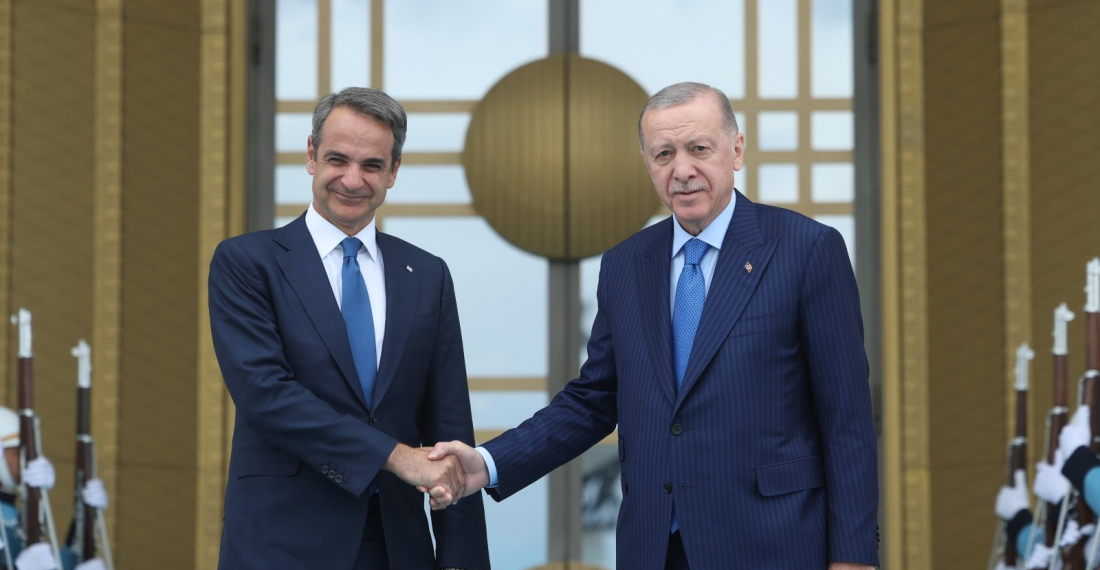A ground breaking meeting between the President of Turkiye, Recip Tayip Erdogan, and Greek Prime minister Kyriakos Mitsotakis, on Monday (13 May) is being hailed as the dawn of a new era of peace in the Eastern Mediterranean. Mitsotakis was in Ankara as the guest of the Turkish leader.
There are no unsolvable problems between Athens and Ankara, President Recep Tayyip Erdoğan said, as he and Greek Prime Minister Kyriakos Mitsotakis praised the state of relations between the two neighbors while pledging to further enhance bilateral ties.
"We had a constructive and positive meeting and discussed problems in Türkiye-Greece relations; We will solve problems through dialogue," Erdoğan said at a joint news conference with Mitsotakis.
Erdoğan said that Ankara and Athens are committed to resolving issues via "cordial dialogue, good neighborly ties, and international law" as outlined in last year's Athens Declaration on Friendly Relations and Good-Neighborliness.
Saying that he and Mitsotakis had a very productive, genuine and constructive meeting, Erdoğan said they both reviewed all issues on their agendas, as he thanked the Greek prime minister for his visit.
Noting that the fight against terrorism, including the Gülenist Terror Group (FETÖ), PKK and DHKP-C terrorists was on top of their agenda, Erdoğan said Ankara and Athens’ counterterrorism cooperation strengthens by day and that they both agree on the fact that there is no future for terrorist groups in future of the region.
Regarding the issue of the Turkish minority in Greece, Erdoğan said Ankara sees minorities as a bridge of friendship between the two countries.
"We expect the positive atmosphere in our relations to contribute to the rights of the Turkish minority in Greece," he said.
Touching on the sensitive issue of Cyprus, Erdoğan said a step toward a solution in Cyprus would strengthen regional peace and stability.
Improvement of bilateral relations with Türkiye is yielding concrete and positive results, Greek Prime Minister Kyriakos Mitsotakis said
"I can only begin by thanking you for the warm hospitality today in Ankara, it was a fourth meeting in the last 10 months, which I believe proves that the two neighbors can now establish this approach of mutual understanding, no longer as some exception, but as a productive normality that is not negated by the known differences in our positions," Mitsotakis said.
He said bilateral relations have been progressing, as agreed by the parties, on three levels: political dialogue, positive agenda and confidence-building measures.
"I believe that it is a positive development in a difficult time for international peace, but also for the broader stability in our region," the Greek leader said.
On cooperation in dealing with irregular migration, Mitsotakis said Athens supports more EU aid to Türkiye, which has also been suffering from the issue.
"Our joint efforts to stop human traffickers have produced results. Türkiye has positively contributed in this regard," he said.
Türkiye itself copes with the irregular migration phenomenon as crises across the world once again put it at the forefront of migrant influx as a gateway to Europe.
The country, which already hosts 4 million refugees, more than any other country in the world, is taking new measures at its borders to prevent a fresh influx of migrants, balancing a humanitarian policy and the need to stop thousands from risking their lives.
As most irregular migrants try to infiltrate into Türkiye through its eastern borders, the country recently began construction of a security wall and authorities say 80% of the wall and a 1,234-kilometer-long patrolling strip next to the wall are completed.
The Directorate of Migration set up “mobile migration points” to speed up the processing of irregular migrants. The migration points help law enforcement in the field to check for irregular migrants.
They use a fingerprint database to check the identity of suspected irregular migrants and cut the red tape for legal migrants who have to prove that they have permits, often by visiting police stations.
Joint statement
In their meeting, both leaders reviewed the results of the 5th High-Level Cooperation Council, which took place in Athens on Dec. 7th, 2023, according to a joint statement made following the meeting.
“The two leaders welcomed the progress achieved to date within the scope of the Positive Agenda Joint Action Plan involving measures of common interest in various fields,” the joint statement said.
In face of environmental challenges, including climate change and the threat of earthquakes, the two sides welcomed the conclusion of a Memorandum of Understanding for Cooperation on Disaster and Emergency Management and signing of an agreement on Cooperation in the Fields of Health and Medical Sciences.
Erdoğan and Mitsotakis tasked their foreign ministers to coordinate work for next meetings in the context of the agreed roadmap, the joint statement said, adding that both sides pledged their commitment to consolidate the current positive climate in line with the 2023 Athens Declaration on Friendly Relations and Good-Neighbourliness, explore further areas of cooperation, continue with regular exchanges and maintain effective communication channels at multiple levels, for the benefit of both nations in an atmosphere of friendship and mutual trust.






